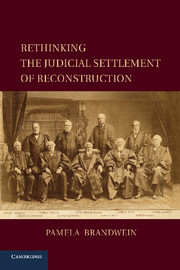Book contents
- Frontmatter
- Contents
- Acknowledgments
- 1 Abandoned Blacks?
- 2 The Emergence of the Concept of State Neglect, 1867–1873
- 3 The Civil/Social Distinction
- 4 The Birth of State Action Doctrine, 1874–1876
- 5 A Surviving Sectional Context, 1876–1891
- 6 The Civil Rights Cases and the Language of State Neglect
- 7 Definitive Judicial Abandonment, 1896–1906
- 8 Twentieth-Century Receptions
- 9 Conclusion
- Bibliography
- Index
4 - The Birth of State Action Doctrine, 1874–1876
Published online by Cambridge University Press: 03 May 2011
- Frontmatter
- Contents
- Acknowledgments
- 1 Abandoned Blacks?
- 2 The Emergence of the Concept of State Neglect, 1867–1873
- 3 The Civil/Social Distinction
- 4 The Birth of State Action Doctrine, 1874–1876
- 5 A Surviving Sectional Context, 1876–1891
- 6 The Civil Rights Cases and the Language of State Neglect
- 7 Definitive Judicial Abandonment, 1896–1906
- 8 Twentieth-Century Receptions
- 9 Conclusion
- Bibliography
- Index
Summary
It was an act of horrific violence and the worst massacre in all of Reconstruction. After a contested election for governor in Colfax, Louisiana, the Ku Klux Klan and its allies in the White League stormed a courthouse occupied by a contending black faction killing an estimated sixty-two to eight-one men. Some in the faction initially fought back, but most of those murdered had been unarmed or had surrendered.
The case United States v. Cruikshank grew from this voting-related massacre. After seeking indictments against ninety-seven men, the federal government brought nine of them to trial and won convictions against three of them. Those three men – William J. Cruikshank, John P. Hadnot, and William B. Irwin – challenged their convictions. And they won, first at the circuit court and then at the Supreme Court. The case is commonly understood as leaving black voters “defenseless” against the Klan and bringing an end to black voting. According to numerous scholars, the Supreme Court decision was devastating because it closed off a state-failure conception of state action. As Lou Faulkner Williams characterizes the decision, “a state's failure to protect its citizens could not be construed as a reason for the federal government to intervene.”
Over the course of the next two chapters I argue that Cruikshank has been misunderstood. One of its legacies was the succor it provided to mobs that wanted Cruikshank and his confederates freed.
- Type
- Chapter
- Information
- Rethinking the Judicial Settlement of Reconstruction , pp. 87 - 128Publisher: Cambridge University PressPrint publication year: 2011

